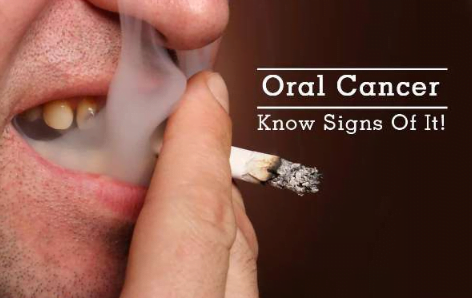Many oral symptoms can be warning signs of cancer. A toothache, cold, numbness and other symptoms can be signs of cancer, especially if they persist for a long time, such as for a number of weeks or months.
If you are experiencing any of these symptoms, it is important that you go to see your care provider to get examined and determine if indeed it is a sign of cancer. Oral tumors cause many symptoms and some symptoms may indicate other things not as serious as cancer

Oral Cancer Oral cancer is the type of cancer that grows in any part of the oral cavity. Mouth cancer can occur in any of the following parts:
- Roof of mouth
- Tongue
- Floor of mouth
- Lips
- The inner lining of the cheeks
- Gums
Cancer of the mouth can also be referred to as oral cancer or oral cavity cancer. Mouth Cancer is part of a group of cancers that are referred to as head and neck cancers. Mouth cancers and other types of head and neck cancers are all often treated in the same way.
Signs of Oral Cancer
Oral cancer can develop anywhere in the oral cavity. It can develop in the throat, the lips, the tongue, the gums, the pharynx, sinuses, larynx and the salivary glands. Successful treatment of oral cancer is heavily dependent on early detection so it is imperative you see your doctor or consult a reliable oral surgeon and possibly for an all on 4 treatment if you have any of the symptoms that follow for more than two weeks:
- Persistent hoarseness and or sore throat
- The feel of an object in your throat or a lump in your throat
- Discomfort in an ear without hearing loss
- Numbness, pain or tenderness in your mouth
- Red or white sores in your mouth or on your lips
- Thick patches, sores, swellings or lumps in your mouth or throat
- Loose teeth
- Problems chewing, moving your jaw, swallowing or speaking
- Swelling that causes denture discomfort
What causes Oral Cancer?
While it is true that cancers, in general, are caused by damage and mutation in the genetic code that controls growth and death of cells in the body, no one knows exactly what causes oral cancer.
Having said that, it is important to point out that there are some things known to increase the chances of getting oral cancer, and they are:
Tobacco: This is one of the most recognized risks of getting oral cancer. Prolonged use of tobacco in all its forms – chewing tobacco, pipes, cigars and cigarettes or even smokeless tobacco are all avenues to get oral cancer.
Exposure to the Sun: Exposing your lips to the sun can cause oral cancer. To mitigate the effect of the sun on your lips, you can use lip balm on your lips. Any lip balm or cream containing SPF is adequate for protection from the sun.
Alcohol: A large amount of alcohol consumption is also linked to oral cancer. People that drink and smoke tobacco at the same time are even more likely to get oral cancer.
Human Papillomavirus (HPV): HPV has been linked to a number of cancers. These cancers can normally be found in the tonsils, the back of the throat and the base of the tongue. This is one of the rising causes of oral cancer.
Other factors of risk of cancer include being exposed to radiation, being older than 45 and contracting any other type of head and neck cancer.

Lowering Your Risk of Oral cancer
These are some of the ways you can lower the risk of getting oral cancer:
Avoid Smoking: Making sure you avoid all forms of tobacco is one of the surest ways of reducing your risk of getting oral cancer. This includes chewing tobacco, pipes, cigars and cigarettes and staying away from second-hand smoke.
If you are a smoker, ensure that you find ways to quit. Even if it means getting help to quit. This is the best way of ensuring you lower your risk of getting oral cancer. Smokers have a higher risk of getting oral cancer than anyone who smoked then quit. The sooner you quit, the lower your chances of getting oral cancer.
Vaccination against Human Papillomavirus (HPV): There are vaccines available to make sure you don’t contract the form of HPV-16 and HPV-18, that is linked to the formation of cancer. If you have oral sex with more than one partner you can contract oral cancer through HPV. Gardasil, Gardasil 9 and Cervarix are three vaccines that are available and can help protect you from HPV. Gardasil 9 is also able to protect you from five other types of HPV that could cause cancer in other areas of the body.
Seeking Medical Advice: Many of the symptoms listed above can be caused by a lot of minor things, things such as infections that are not so serious. With this in mind, it is still highly advised that you see your doctor or dentist if any of the symptoms listed above last longer than three weeks. If you are a drinker or a smoker, this is especially important for you.








Nice post
we should spread the awareness about the cancer